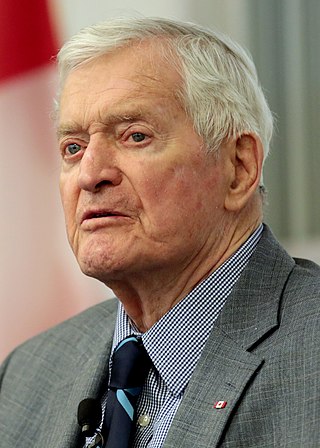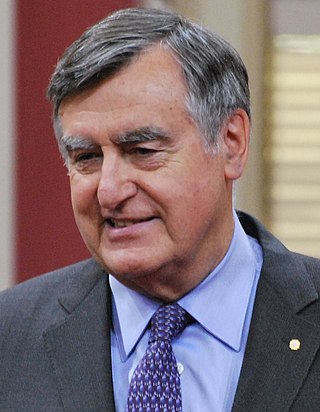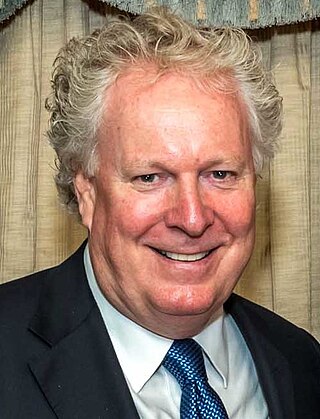
John Napier Wyndham Turner was a Canadian lawyer and politician who served as the 17th prime minister of Canada from June to September 1984. He served as leader of the Liberal Party of Canada and leader of the Official Opposition from 1984 to 1990.

Martin Brian Mulroney was a Canadian lawyer, businessman, and politician who served as the 18th prime minister of Canada from 1984 to 1993.

Charles Joseph Clark is a Canadian businessman, writer, and politician who served as the 16th prime minister of Canada from 1979 to 1980.

Lucien Bouchard is a French Canadian lawyer, diplomat and retired politician.

John James "Jean" Charest is a Canadian lawyer and former politician who served as the 29th premier of Quebec from 2003 to 2012. Prior to that, he was a member of Parliament (MP) between 1984 and 1998. After holding several Cabinet posts from 1986 to 1990 and from 1991 to 1993, he was the leader of the Progressive Conservative Party of Canada from 1993 to 1998.
The Charlottetown Accord was a package of proposed amendments to the Constitution of Canada, proposed by the Canadian federal and provincial governments in 1992. It was submitted to a public referendum on October 26 and was defeated.

The Meech Lake Accord was a series of proposed amendments to the Constitution of Canada negotiated in 1987 by Prime Minister Brian Mulroney and all 10 Canadian provincial premiers. It was intended to persuade the government of Quebec to symbolically endorse the 1982 constitutional amendments by providing for some decentralization of the Canadian federation.

This section of the Timeline of Quebec history concerns the events between patriation of the British North America Act and the present day.

The 1995 Quebec referendum was the second referendum to ask voters in the predominantly French-speaking Canadian province of Quebec whether Quebec should proclaim sovereignty and become an independent country, with the condition precedent of offering a political and economic agreement to Canada.
The sponsorship scandal, AdScam or Sponsorgate, was a scandal in Canada that came as a result of a federal government "sponsorship program" in the province of Quebec involving the Liberal Party of Canada, which was in power from 1993 to 2006.
Marcel Danis, is a Canadian university administrator, lawyer and former politician.
Louis Yves Fortier is a Canadian diplomat, trial and appellate lawyer, arbitrator and corporate director. He served as the Canadian Ambassador to the United Nations from August 1988 to December 1991. In August 2013, he became a member of the Security Intelligence Review Committee and the Queen's Privy Council for Canada. He also served as the national president of the Canadian Bar Association from 1982 to 1983.

Section 16.1 of the Canadian Charter of Rights and Freedoms guarantees equality between English-speaking and French-speaking residents of New Brunswick. Enacted in 1993, it is the most recent addition to the Charter.
Louis Plamondon is a Canadian politician who served as the interim speaker of the House of Commons of Canada from September 27 to October 3, 2023. A member of the Bloc Québécois, he has represented Bécancour—Nicolet—Saurel since 1984. As the longest-serving current member of the House of Commons, Plamondon is Dean of the House, and holds the record as Canada's longest-serving dean.

The history of Canada (1982–present) refers to the period immediately following the Canada Act until the present.
Stanley Herbert Hartt, was a Canadian lawyer, lecturer, businessman, and civil servant. He was Chief of Staff to Canadian Prime Minister Brian Mulroney from 1989 to 1990.
Keith Spicer was a Canadian academic, public servant, journalist, and writer. Between 1970 and 1977, Spicer was Canada's first Commissioner of Official Languages.
The Allaire Report was a report written by the constitutional reform committee of the Liberal Party of Quebec, chaired by lawyer and politician Jean Allaire, recommending a significant transfer of powers from Canada's federal government to the Government of Quebec. Entitled "A Quebec Free to Choose", the report was published on January 29, 1991, and adopted as party policy by the Liberal Party at their 25th convention on March 9, 1991.
Denis de Belleval is a former politician and administrator in the Canadian province of Quebec. He was a Parti Québécois member of the National Assembly of Quebec from 1976 to 1982 and was a cabinet minister in the government of René Lévesque. He has also held several administrative positions, including a two-year tenure as the president of Via Rail.









